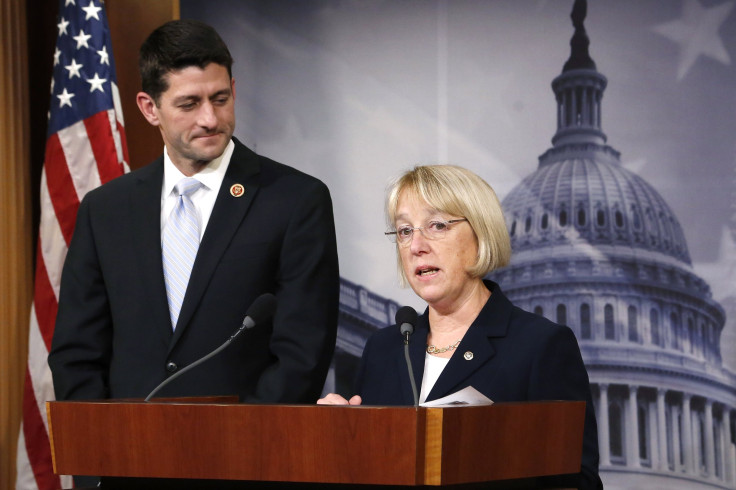House Passes Bipartisan Budget Deal

The U.S. House of Representatives on Thursday passed a bipartisan budget deal -- struck earlier this week by leaders Rep. Paul Ryan and Sen. Patty Murray -- to set the federal spending levels for the next two years and cut the deficit by $23 billion.
The bill passed overwhelmingly with a vote of 332-94, with 169 Republicans and 163 Democrats voting in favor, and 62 Republicans and 32 Democrats voting against. The measure will now be sent to the Senate, which is poised to pass it next week -- despite the objections of conservative groups complaining that it traduces the goal of cutting government spending -- before it goes out of session this year.
The Ryan-Murray deal resulted from an agreement in October to end a 16-day government shutdown. Under the deal, Washington will operate with a level of normalcy that hasn’t been seen in years. Lawmakers will have room next year -- an election year -- to pass all 12 appropriations bills at one time. There will be no risk of a government shutdown. Past budget deadlock has left Congress relying on a temporary stop-gap funding measure known as a continuing resolution for about three years.
Ryan and Rep. Chris Van Hollen, a ranking member of the Budget Committee, called the bill a “step forward.”
The budget battle triggered the first round of across-the-board automatic spending cuts known as a sequester earlier this year. The new agreement substitutes $63 billion in sequestration cuts with other savings and increase federal spending to $1.012 trillion for fiscal 2014, which began in October. This uptick in spending will be offset by higher retirement-plan contributions by federal workers and increases in airline-passenger security fees.
“It's not everything that we wanted,” House Speaker John Boehner, R-Ohio, said earlier at a press briefing, “but it matches conservative policy and moves us in the right direction.”
Yet with budget leaders able to see eye-to-eye for the first time in years, it’s not the same for some conservative lobbying groups and tea party members in Congress who are critical of the deal because it increases spending far above the $967 billion set by sequestration.
Conservative groups like Americans For Prosperity (AFP) have criticized the deal, arguing that their elected leaders should be protecting the pocketbooks of average Americans instead of compromising on a sequester they credit for reducing overspending. AFP said the more than $40 billion spending increase is a step in the wrong direction.
“This budget compromise is not just bad policy, it is bad politics,” said Americans For Prosperity President Tim Phillips. “The American people remember hard-won bipartisan spending limits set by the sequester, and are not pleased to see their conservative representatives so easily go back on their word to rein in government over-spending.”
Still, the House GOP backs the bill. The drama between conservatives also heightened Wednesday when Boehner pushed back at critics of the deal.
“They’re using our members and they’re using the American people for their own goals,” he said. “This is ridiculous. Listen, if you are for more deficit reduction you are for this agreement.”
Boehner took another swipe at the conservative groups Thursday, saying “when groups come out and criticize an agreement that they've never seen you begin to wonder just how credible those actions are.” The speaker said amidst the criticism that he felt it was his job to stand up for conservatives in Congress who want more deficit reduction and Ryan's achievement.
“Our job is to find enough common ground to move the ball down the field on behalf of the American people who sent us here to do their work,” he said, later adding that these groups “have lost all credibility.”
Some Democrats have also not taken too kindly to the legislation because it includes no new tax revenues nor tackles the unemployment benefits, and it cuts federal employees' pension. According to Politico, Democrats were expecting Republicans to not be able to bring enough votes and will therefore, need the help.
House Minority Leader Nancy Pelosi, D-Calif., has called the deal a “draw.” She earlier said she hopes it will clear the House and allow for work to be done on other issues like immigration reform, minimum wage increases and job creation where Democrats want to paint a picture of Republicans as a “do-nothing” group.
“Let us get this out of the way,” Pelosi said earlier at her weekly press briefing. “The Republicans, they never miss an opportunity to miss an opportunity when it comes to job creation. In this budget we could've had, as Chris Van Hollen had suggested, investments in short-term and long-term growth.”
She knocked the GOP for not closing loopholes that could have led to investments in infrastructure and early childhood education.
© Copyright IBTimes 2025. All rights reserved.






















